Detailed Case Analysis: Australian Contract Law - Parts A & B
VerifiedAdded on 2022/08/20
|16
|4282
|10
Case Study
AI Summary
This assignment presents a case study analyzing two scenarios under Australian contract law. The first scenario involves a contract dispute between Charlotte and Jonah, focusing on issues of contractual obligations, undue influence, and potential discharge of debt by a third party. The analysis employs the IRAC method to address whether Charlotte was obligated to pay an additional amount to Jonah, considering the principles of offer, acceptance, consideration, and the impact of Peter's actions. The second scenario examines potential vitiating circumstances in transactions involving SD and Cecil, exploring available remedies under contract law. The assignment requires a detailed examination of relevant case law and legislation from the textbook "Contract Law in Context" by Jason Harris and Christopher Croese, demonstrating a strong understanding of contract law principles, particularly those related to vitiating factors such as undue influence and unconscionable conduct, and their impact on the enforceability of contracts. The analysis must incorporate specific references to the provided case law and legislation, adhering to the IRAC method for a comprehensive legal assessment.
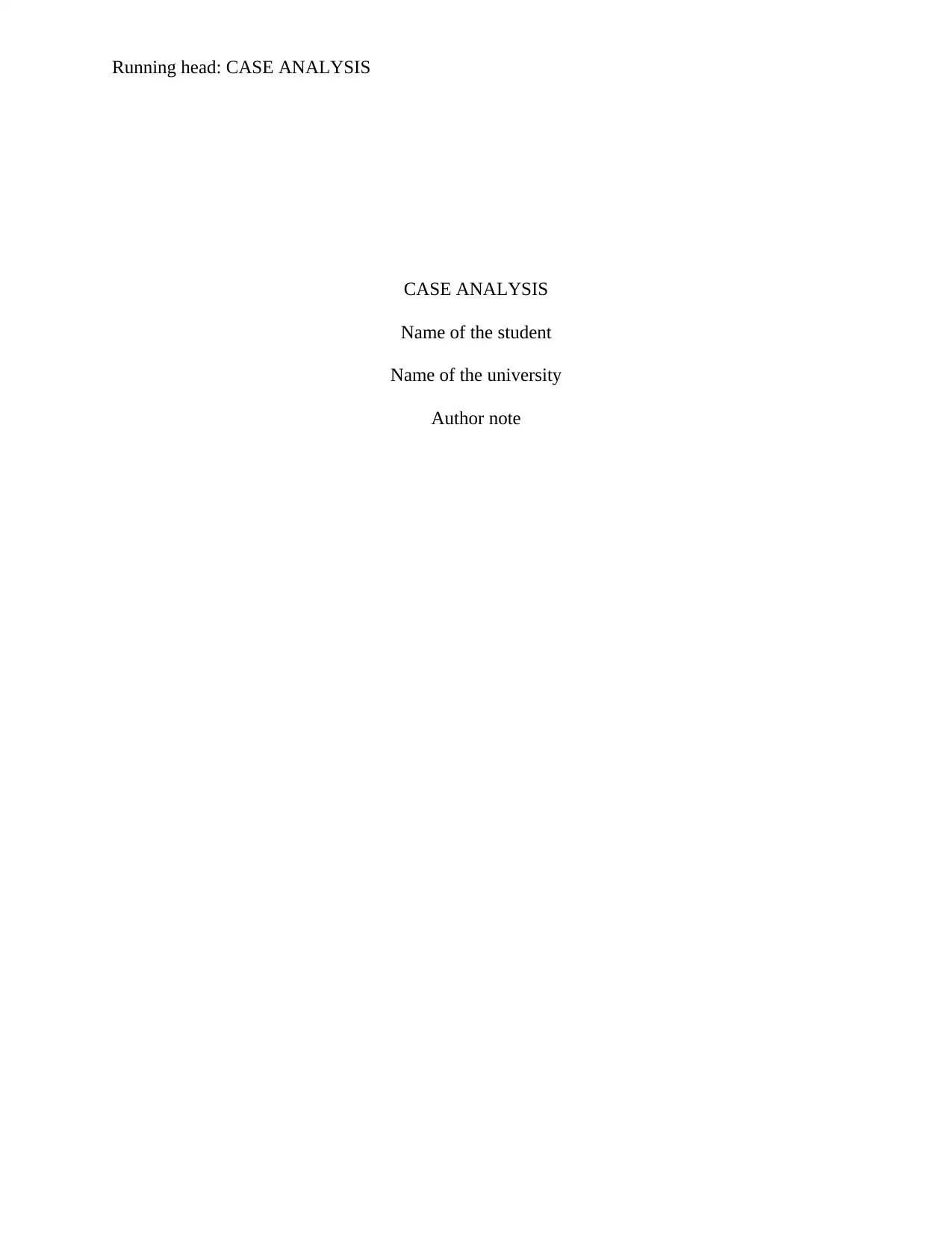
Running head: CASE ANALYSIS
CASE ANALYSIS
Name of the student
Name of the university
Author note
CASE ANALYSIS
Name of the student
Name of the university
Author note
Paraphrase This Document
Need a fresh take? Get an instant paraphrase of this document with our AI Paraphraser
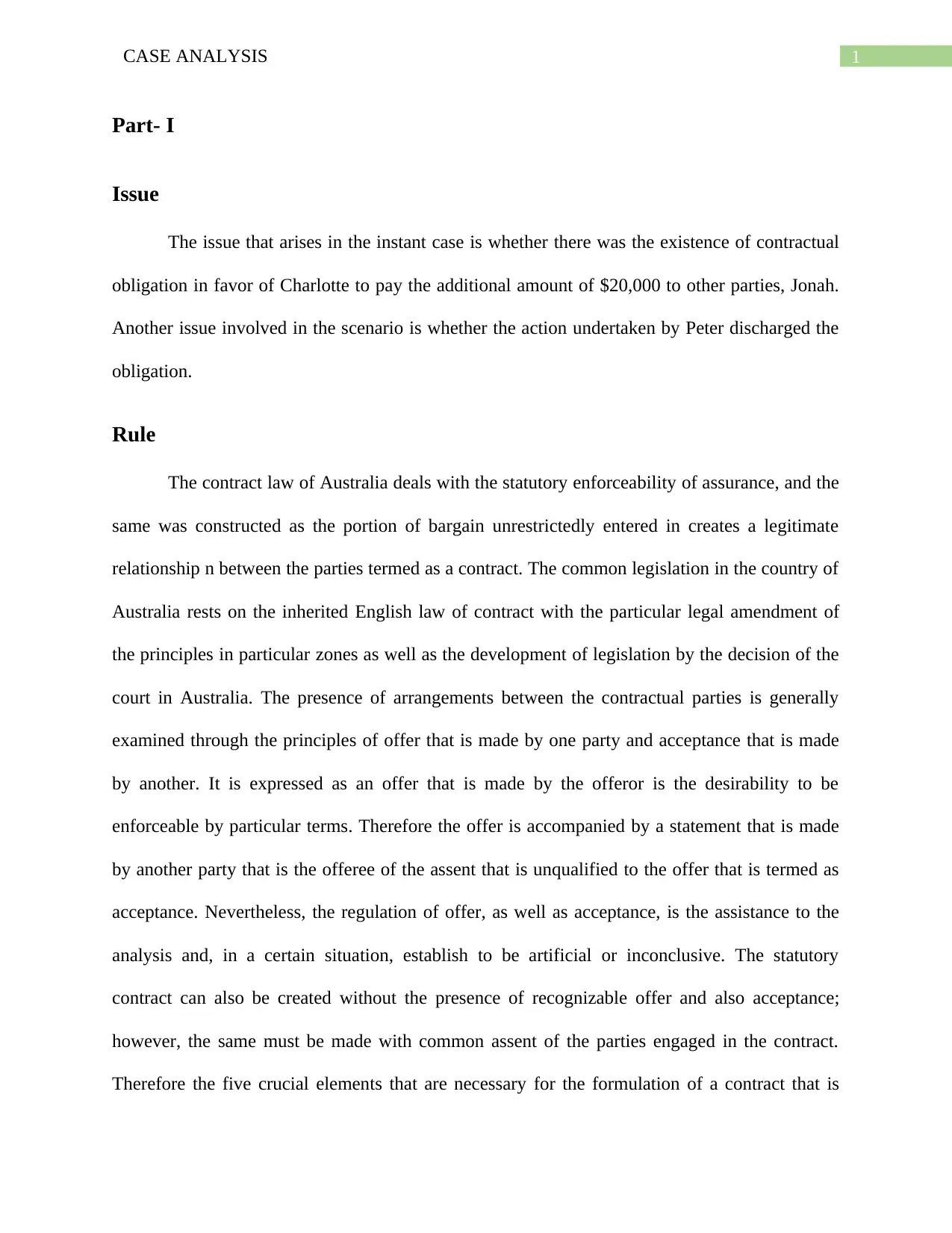
1CASE ANALYSIS
Part- I
Issue
The issue that arises in the instant case is whether there was the existence of contractual
obligation in favor of Charlotte to pay the additional amount of $20,000 to other parties, Jonah.
Another issue involved in the scenario is whether the action undertaken by Peter discharged the
obligation.
Rule
The contract law of Australia deals with the statutory enforceability of assurance, and the
same was constructed as the portion of bargain unrestrictedly entered in creates a legitimate
relationship n between the parties termed as a contract. The common legislation in the country of
Australia rests on the inherited English law of contract with the particular legal amendment of
the principles in particular zones as well as the development of legislation by the decision of the
court in Australia. The presence of arrangements between the contractual parties is generally
examined through the principles of offer that is made by one party and acceptance that is made
by another. It is expressed as an offer that is made by the offeror is the desirability to be
enforceable by particular terms. Therefore the offer is accompanied by a statement that is made
by another party that is the offeree of the assent that is unqualified to the offer that is termed as
acceptance. Nevertheless, the regulation of offer, as well as acceptance, is the assistance to the
analysis and, in a certain situation, establish to be artificial or inconclusive. The statutory
contract can also be created without the presence of recognizable offer and also acceptance;
however, the same must be made with common assent of the parties engaged in the contract.
Therefore the five crucial elements that are necessary for the formulation of a contract that is
Part- I
Issue
The issue that arises in the instant case is whether there was the existence of contractual
obligation in favor of Charlotte to pay the additional amount of $20,000 to other parties, Jonah.
Another issue involved in the scenario is whether the action undertaken by Peter discharged the
obligation.
Rule
The contract law of Australia deals with the statutory enforceability of assurance, and the
same was constructed as the portion of bargain unrestrictedly entered in creates a legitimate
relationship n between the parties termed as a contract. The common legislation in the country of
Australia rests on the inherited English law of contract with the particular legal amendment of
the principles in particular zones as well as the development of legislation by the decision of the
court in Australia. The presence of arrangements between the contractual parties is generally
examined through the principles of offer that is made by one party and acceptance that is made
by another. It is expressed as an offer that is made by the offeror is the desirability to be
enforceable by particular terms. Therefore the offer is accompanied by a statement that is made
by another party that is the offeree of the assent that is unqualified to the offer that is termed as
acceptance. Nevertheless, the regulation of offer, as well as acceptance, is the assistance to the
analysis and, in a certain situation, establish to be artificial or inconclusive. The statutory
contract can also be created without the presence of recognizable offer and also acceptance;
however, the same must be made with common assent of the parties engaged in the contract.
Therefore the five crucial elements that are necessary for the formulation of a contract that is
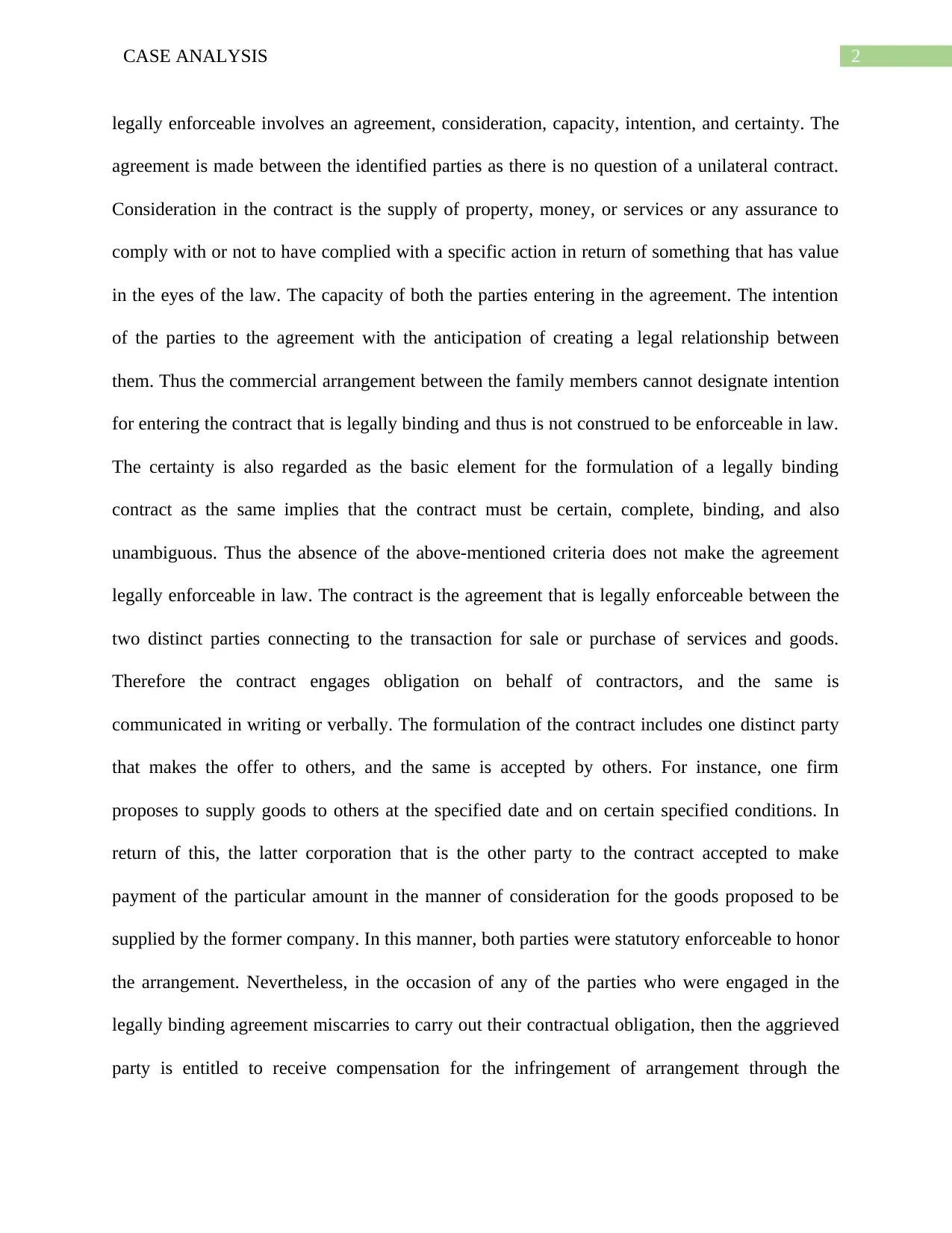
2CASE ANALYSIS
legally enforceable involves an agreement, consideration, capacity, intention, and certainty. The
agreement is made between the identified parties as there is no question of a unilateral contract.
Consideration in the contract is the supply of property, money, or services or any assurance to
comply with or not to have complied with a specific action in return of something that has value
in the eyes of the law. The capacity of both the parties entering in the agreement. The intention
of the parties to the agreement with the anticipation of creating a legal relationship between
them. Thus the commercial arrangement between the family members cannot designate intention
for entering the contract that is legally binding and thus is not construed to be enforceable in law.
The certainty is also regarded as the basic element for the formulation of a legally binding
contract as the same implies that the contract must be certain, complete, binding, and also
unambiguous. Thus the absence of the above-mentioned criteria does not make the agreement
legally enforceable in law. The contract is the agreement that is legally enforceable between the
two distinct parties connecting to the transaction for sale or purchase of services and goods.
Therefore the contract engages obligation on behalf of contractors, and the same is
communicated in writing or verbally. The formulation of the contract includes one distinct party
that makes the offer to others, and the same is accepted by others. For instance, one firm
proposes to supply goods to others at the specified date and on certain specified conditions. In
return of this, the latter corporation that is the other party to the contract accepted to make
payment of the particular amount in the manner of consideration for the goods proposed to be
supplied by the former company. In this manner, both parties were statutory enforceable to honor
the arrangement. Nevertheless, in the occasion of any of the parties who were engaged in the
legally binding agreement miscarries to carry out their contractual obligation, then the aggrieved
party is entitled to receive compensation for the infringement of arrangement through the
legally enforceable involves an agreement, consideration, capacity, intention, and certainty. The
agreement is made between the identified parties as there is no question of a unilateral contract.
Consideration in the contract is the supply of property, money, or services or any assurance to
comply with or not to have complied with a specific action in return of something that has value
in the eyes of the law. The capacity of both the parties entering in the agreement. The intention
of the parties to the agreement with the anticipation of creating a legal relationship between
them. Thus the commercial arrangement between the family members cannot designate intention
for entering the contract that is legally binding and thus is not construed to be enforceable in law.
The certainty is also regarded as the basic element for the formulation of a legally binding
contract as the same implies that the contract must be certain, complete, binding, and also
unambiguous. Thus the absence of the above-mentioned criteria does not make the agreement
legally enforceable in law. The contract is the agreement that is legally enforceable between the
two distinct parties connecting to the transaction for sale or purchase of services and goods.
Therefore the contract engages obligation on behalf of contractors, and the same is
communicated in writing or verbally. The formulation of the contract includes one distinct party
that makes the offer to others, and the same is accepted by others. For instance, one firm
proposes to supply goods to others at the specified date and on certain specified conditions. In
return of this, the latter corporation that is the other party to the contract accepted to make
payment of the particular amount in the manner of consideration for the goods proposed to be
supplied by the former company. In this manner, both parties were statutory enforceable to honor
the arrangement. Nevertheless, in the occasion of any of the parties who were engaged in the
legally binding agreement miscarries to carry out their contractual obligation, then the aggrieved
party is entitled to receive compensation for the infringement of arrangement through the
⊘ This is a preview!⊘
Do you want full access?
Subscribe today to unlock all pages.

Trusted by 1+ million students worldwide
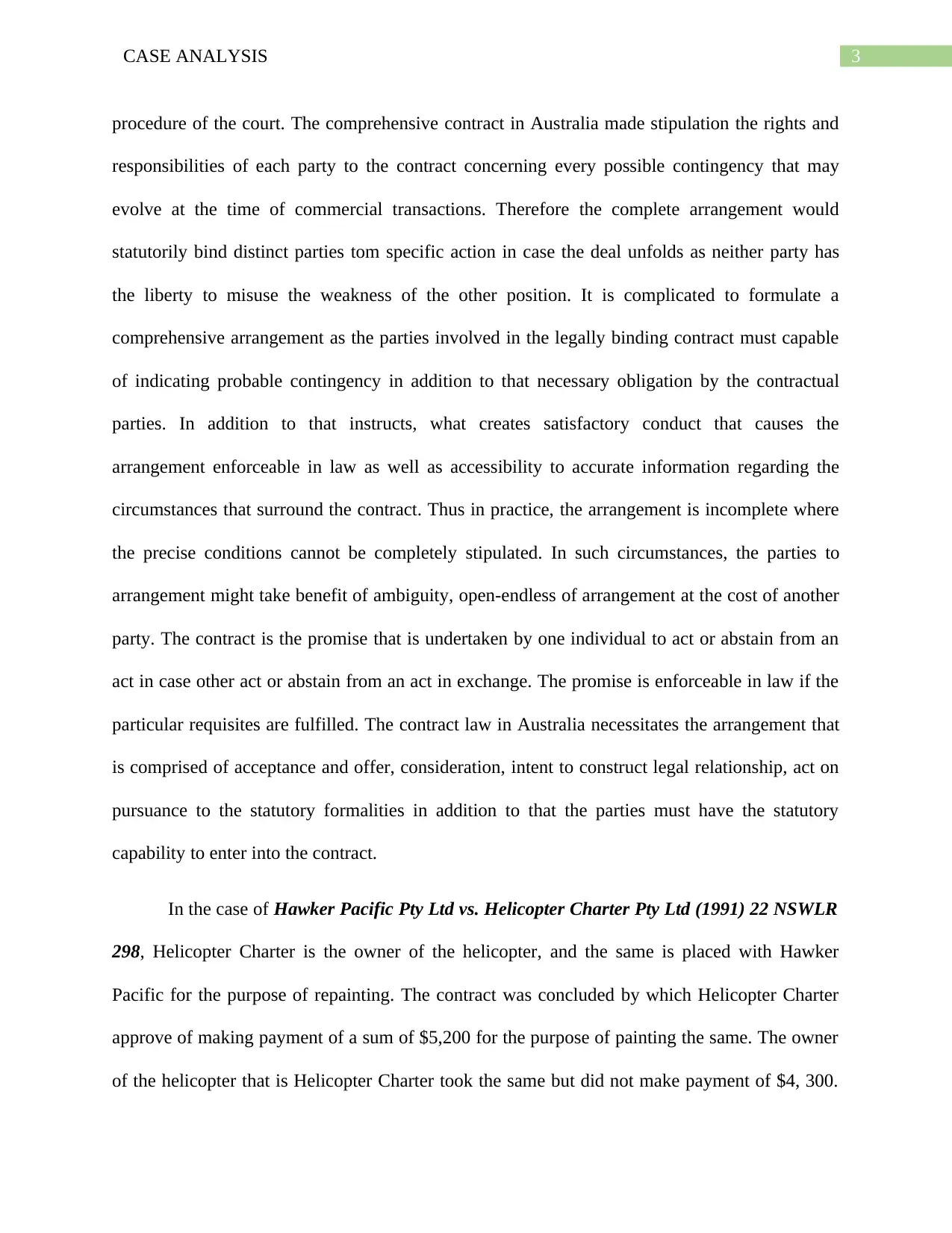
3CASE ANALYSIS
procedure of the court. The comprehensive contract in Australia made stipulation the rights and
responsibilities of each party to the contract concerning every possible contingency that may
evolve at the time of commercial transactions. Therefore the complete arrangement would
statutorily bind distinct parties tom specific action in case the deal unfolds as neither party has
the liberty to misuse the weakness of the other position. It is complicated to formulate a
comprehensive arrangement as the parties involved in the legally binding contract must capable
of indicating probable contingency in addition to that necessary obligation by the contractual
parties. In addition to that instructs, what creates satisfactory conduct that causes the
arrangement enforceable in law as well as accessibility to accurate information regarding the
circumstances that surround the contract. Thus in practice, the arrangement is incomplete where
the precise conditions cannot be completely stipulated. In such circumstances, the parties to
arrangement might take benefit of ambiguity, open-endless of arrangement at the cost of another
party. The contract is the promise that is undertaken by one individual to act or abstain from an
act in case other act or abstain from an act in exchange. The promise is enforceable in law if the
particular requisites are fulfilled. The contract law in Australia necessitates the arrangement that
is comprised of acceptance and offer, consideration, intent to construct legal relationship, act on
pursuance to the statutory formalities in addition to that the parties must have the statutory
capability to enter into the contract.
In the case of Hawker Pacific Pty Ltd vs. Helicopter Charter Pty Ltd (1991) 22 NSWLR
298, Helicopter Charter is the owner of the helicopter, and the same is placed with Hawker
Pacific for the purpose of repainting. The contract was concluded by which Helicopter Charter
approve of making payment of a sum of $5,200 for the purpose of painting the same. The owner
of the helicopter that is Helicopter Charter took the same but did not make payment of $4, 300.
procedure of the court. The comprehensive contract in Australia made stipulation the rights and
responsibilities of each party to the contract concerning every possible contingency that may
evolve at the time of commercial transactions. Therefore the complete arrangement would
statutorily bind distinct parties tom specific action in case the deal unfolds as neither party has
the liberty to misuse the weakness of the other position. It is complicated to formulate a
comprehensive arrangement as the parties involved in the legally binding contract must capable
of indicating probable contingency in addition to that necessary obligation by the contractual
parties. In addition to that instructs, what creates satisfactory conduct that causes the
arrangement enforceable in law as well as accessibility to accurate information regarding the
circumstances that surround the contract. Thus in practice, the arrangement is incomplete where
the precise conditions cannot be completely stipulated. In such circumstances, the parties to
arrangement might take benefit of ambiguity, open-endless of arrangement at the cost of another
party. The contract is the promise that is undertaken by one individual to act or abstain from an
act in case other act or abstain from an act in exchange. The promise is enforceable in law if the
particular requisites are fulfilled. The contract law in Australia necessitates the arrangement that
is comprised of acceptance and offer, consideration, intent to construct legal relationship, act on
pursuance to the statutory formalities in addition to that the parties must have the statutory
capability to enter into the contract.
In the case of Hawker Pacific Pty Ltd vs. Helicopter Charter Pty Ltd (1991) 22 NSWLR
298, Helicopter Charter is the owner of the helicopter, and the same is placed with Hawker
Pacific for the purpose of repainting. The contract was concluded by which Helicopter Charter
approve of making payment of a sum of $5,200 for the purpose of painting the same. The owner
of the helicopter that is Helicopter Charter took the same but did not make payment of $4, 300.
Paraphrase This Document
Need a fresh take? Get an instant paraphrase of this document with our AI Paraphraser
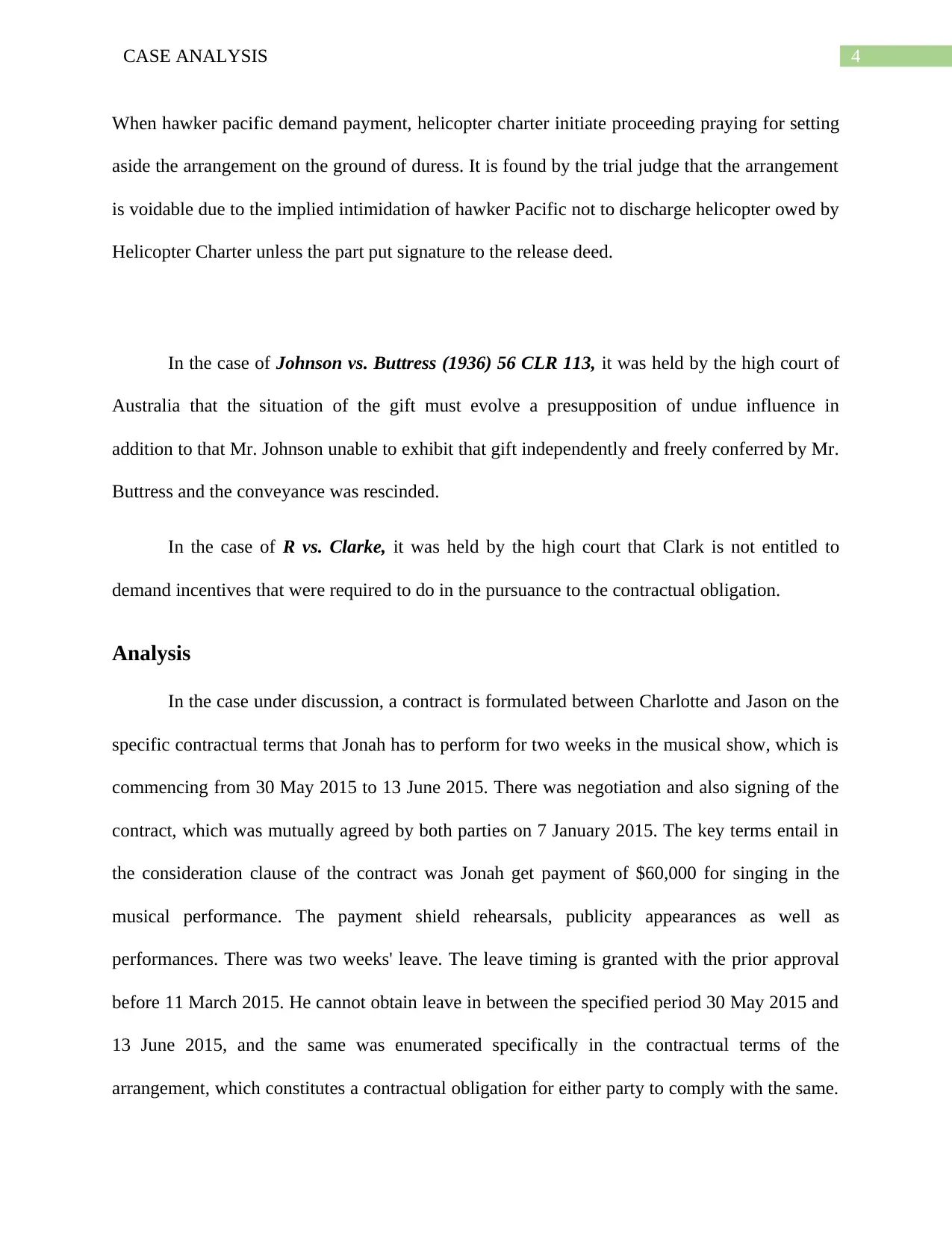
4CASE ANALYSIS
When hawker pacific demand payment, helicopter charter initiate proceeding praying for setting
aside the arrangement on the ground of duress. It is found by the trial judge that the arrangement
is voidable due to the implied intimidation of hawker Pacific not to discharge helicopter owed by
Helicopter Charter unless the part put signature to the release deed.
In the case of Johnson vs. Buttress (1936) 56 CLR 113, it was held by the high court of
Australia that the situation of the gift must evolve a presupposition of undue influence in
addition to that Mr. Johnson unable to exhibit that gift independently and freely conferred by Mr.
Buttress and the conveyance was rescinded.
In the case of R vs. Clarke, it was held by the high court that Clark is not entitled to
demand incentives that were required to do in the pursuance to the contractual obligation.
Analysis
In the case under discussion, a contract is formulated between Charlotte and Jason on the
specific contractual terms that Jonah has to perform for two weeks in the musical show, which is
commencing from 30 May 2015 to 13 June 2015. There was negotiation and also signing of the
contract, which was mutually agreed by both parties on 7 January 2015. The key terms entail in
the consideration clause of the contract was Jonah get payment of $60,000 for singing in the
musical performance. The payment shield rehearsals, publicity appearances as well as
performances. There was two weeks' leave. The leave timing is granted with the prior approval
before 11 March 2015. He cannot obtain leave in between the specified period 30 May 2015 and
13 June 2015, and the same was enumerated specifically in the contractual terms of the
arrangement, which constitutes a contractual obligation for either party to comply with the same.
When hawker pacific demand payment, helicopter charter initiate proceeding praying for setting
aside the arrangement on the ground of duress. It is found by the trial judge that the arrangement
is voidable due to the implied intimidation of hawker Pacific not to discharge helicopter owed by
Helicopter Charter unless the part put signature to the release deed.
In the case of Johnson vs. Buttress (1936) 56 CLR 113, it was held by the high court of
Australia that the situation of the gift must evolve a presupposition of undue influence in
addition to that Mr. Johnson unable to exhibit that gift independently and freely conferred by Mr.
Buttress and the conveyance was rescinded.
In the case of R vs. Clarke, it was held by the high court that Clark is not entitled to
demand incentives that were required to do in the pursuance to the contractual obligation.
Analysis
In the case under discussion, a contract is formulated between Charlotte and Jason on the
specific contractual terms that Jonah has to perform for two weeks in the musical show, which is
commencing from 30 May 2015 to 13 June 2015. There was negotiation and also signing of the
contract, which was mutually agreed by both parties on 7 January 2015. The key terms entail in
the consideration clause of the contract was Jonah get payment of $60,000 for singing in the
musical performance. The payment shield rehearsals, publicity appearances as well as
performances. There was two weeks' leave. The leave timing is granted with the prior approval
before 11 March 2015. He cannot obtain leave in between the specified period 30 May 2015 and
13 June 2015, and the same was enumerated specifically in the contractual terms of the
arrangement, which constitutes a contractual obligation for either party to comply with the same.
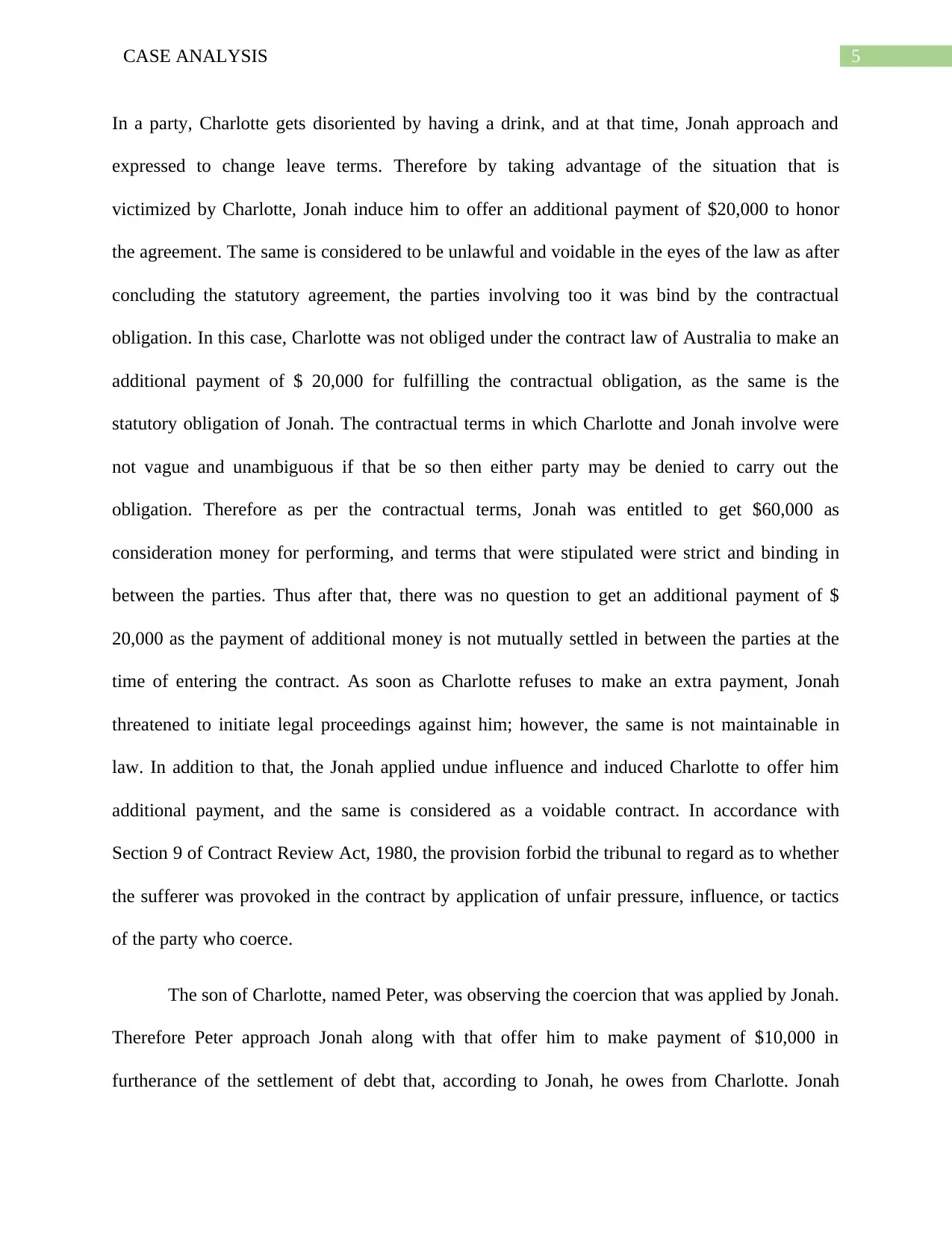
5CASE ANALYSIS
In a party, Charlotte gets disoriented by having a drink, and at that time, Jonah approach and
expressed to change leave terms. Therefore by taking advantage of the situation that is
victimized by Charlotte, Jonah induce him to offer an additional payment of $20,000 to honor
the agreement. The same is considered to be unlawful and voidable in the eyes of the law as after
concluding the statutory agreement, the parties involving too it was bind by the contractual
obligation. In this case, Charlotte was not obliged under the contract law of Australia to make an
additional payment of $ 20,000 for fulfilling the contractual obligation, as the same is the
statutory obligation of Jonah. The contractual terms in which Charlotte and Jonah involve were
not vague and unambiguous if that be so then either party may be denied to carry out the
obligation. Therefore as per the contractual terms, Jonah was entitled to get $60,000 as
consideration money for performing, and terms that were stipulated were strict and binding in
between the parties. Thus after that, there was no question to get an additional payment of $
20,000 as the payment of additional money is not mutually settled in between the parties at the
time of entering the contract. As soon as Charlotte refuses to make an extra payment, Jonah
threatened to initiate legal proceedings against him; however, the same is not maintainable in
law. In addition to that, the Jonah applied undue influence and induced Charlotte to offer him
additional payment, and the same is considered as a voidable contract. In accordance with
Section 9 of Contract Review Act, 1980, the provision forbid the tribunal to regard as to whether
the sufferer was provoked in the contract by application of unfair pressure, influence, or tactics
of the party who coerce.
The son of Charlotte, named Peter, was observing the coercion that was applied by Jonah.
Therefore Peter approach Jonah along with that offer him to make payment of $10,000 in
furtherance of the settlement of debt that, according to Jonah, he owes from Charlotte. Jonah
In a party, Charlotte gets disoriented by having a drink, and at that time, Jonah approach and
expressed to change leave terms. Therefore by taking advantage of the situation that is
victimized by Charlotte, Jonah induce him to offer an additional payment of $20,000 to honor
the agreement. The same is considered to be unlawful and voidable in the eyes of the law as after
concluding the statutory agreement, the parties involving too it was bind by the contractual
obligation. In this case, Charlotte was not obliged under the contract law of Australia to make an
additional payment of $ 20,000 for fulfilling the contractual obligation, as the same is the
statutory obligation of Jonah. The contractual terms in which Charlotte and Jonah involve were
not vague and unambiguous if that be so then either party may be denied to carry out the
obligation. Therefore as per the contractual terms, Jonah was entitled to get $60,000 as
consideration money for performing, and terms that were stipulated were strict and binding in
between the parties. Thus after that, there was no question to get an additional payment of $
20,000 as the payment of additional money is not mutually settled in between the parties at the
time of entering the contract. As soon as Charlotte refuses to make an extra payment, Jonah
threatened to initiate legal proceedings against him; however, the same is not maintainable in
law. In addition to that, the Jonah applied undue influence and induced Charlotte to offer him
additional payment, and the same is considered as a voidable contract. In accordance with
Section 9 of Contract Review Act, 1980, the provision forbid the tribunal to regard as to whether
the sufferer was provoked in the contract by application of unfair pressure, influence, or tactics
of the party who coerce.
The son of Charlotte, named Peter, was observing the coercion that was applied by Jonah.
Therefore Peter approach Jonah along with that offer him to make payment of $10,000 in
furtherance of the settlement of debt that, according to Jonah, he owes from Charlotte. Jonah
⊘ This is a preview!⊘
Do you want full access?
Subscribe today to unlock all pages.

Trusted by 1+ million students worldwide
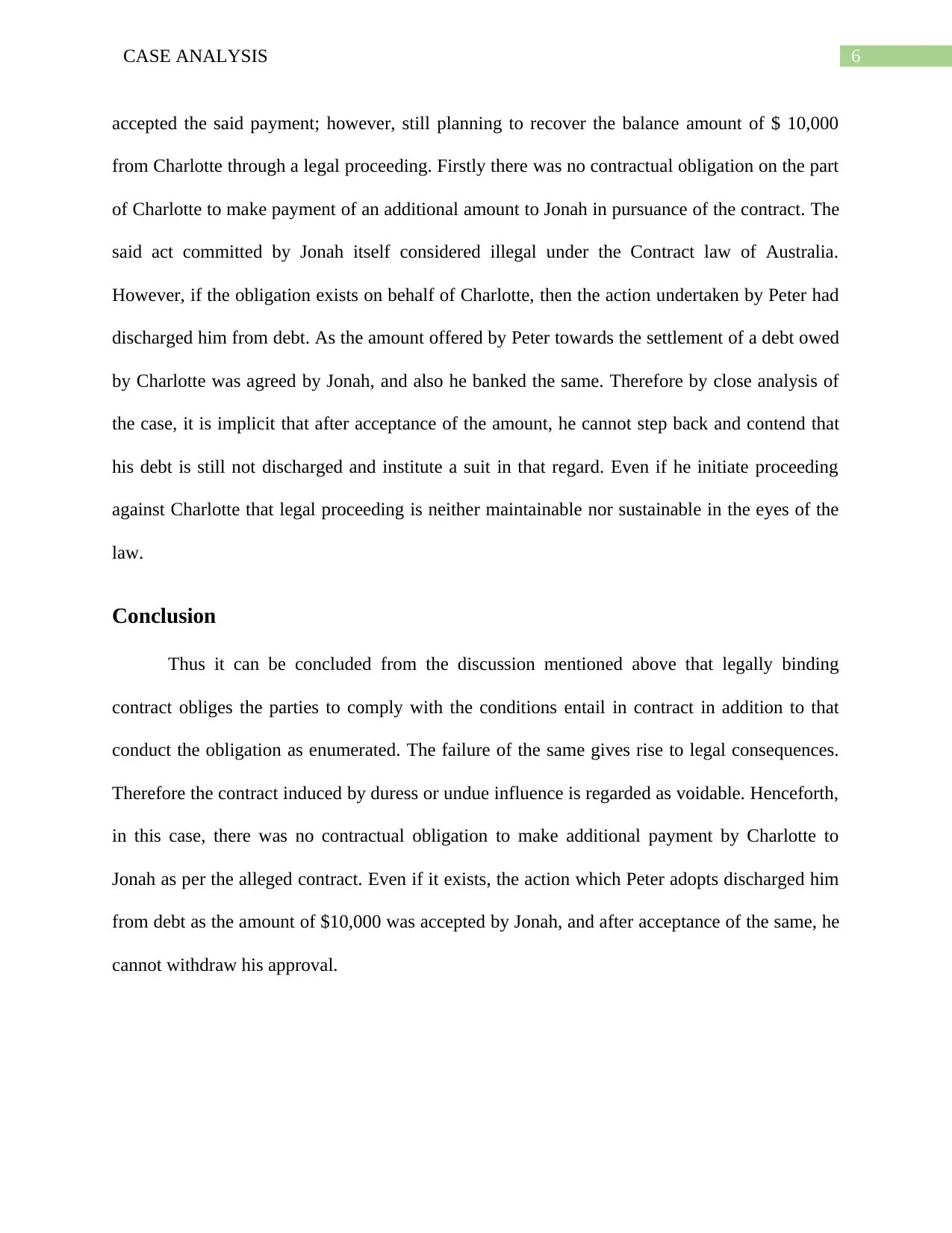
6CASE ANALYSIS
accepted the said payment; however, still planning to recover the balance amount of $ 10,000
from Charlotte through a legal proceeding. Firstly there was no contractual obligation on the part
of Charlotte to make payment of an additional amount to Jonah in pursuance of the contract. The
said act committed by Jonah itself considered illegal under the Contract law of Australia.
However, if the obligation exists on behalf of Charlotte, then the action undertaken by Peter had
discharged him from debt. As the amount offered by Peter towards the settlement of a debt owed
by Charlotte was agreed by Jonah, and also he banked the same. Therefore by close analysis of
the case, it is implicit that after acceptance of the amount, he cannot step back and contend that
his debt is still not discharged and institute a suit in that regard. Even if he initiate proceeding
against Charlotte that legal proceeding is neither maintainable nor sustainable in the eyes of the
law.
Conclusion
Thus it can be concluded from the discussion mentioned above that legally binding
contract obliges the parties to comply with the conditions entail in contract in addition to that
conduct the obligation as enumerated. The failure of the same gives rise to legal consequences.
Therefore the contract induced by duress or undue influence is regarded as voidable. Henceforth,
in this case, there was no contractual obligation to make additional payment by Charlotte to
Jonah as per the alleged contract. Even if it exists, the action which Peter adopts discharged him
from debt as the amount of $10,000 was accepted by Jonah, and after acceptance of the same, he
cannot withdraw his approval.
accepted the said payment; however, still planning to recover the balance amount of $ 10,000
from Charlotte through a legal proceeding. Firstly there was no contractual obligation on the part
of Charlotte to make payment of an additional amount to Jonah in pursuance of the contract. The
said act committed by Jonah itself considered illegal under the Contract law of Australia.
However, if the obligation exists on behalf of Charlotte, then the action undertaken by Peter had
discharged him from debt. As the amount offered by Peter towards the settlement of a debt owed
by Charlotte was agreed by Jonah, and also he banked the same. Therefore by close analysis of
the case, it is implicit that after acceptance of the amount, he cannot step back and contend that
his debt is still not discharged and institute a suit in that regard. Even if he initiate proceeding
against Charlotte that legal proceeding is neither maintainable nor sustainable in the eyes of the
law.
Conclusion
Thus it can be concluded from the discussion mentioned above that legally binding
contract obliges the parties to comply with the conditions entail in contract in addition to that
conduct the obligation as enumerated. The failure of the same gives rise to legal consequences.
Therefore the contract induced by duress or undue influence is regarded as voidable. Henceforth,
in this case, there was no contractual obligation to make additional payment by Charlotte to
Jonah as per the alleged contract. Even if it exists, the action which Peter adopts discharged him
from debt as the amount of $10,000 was accepted by Jonah, and after acceptance of the same, he
cannot withdraw his approval.
Paraphrase This Document
Need a fresh take? Get an instant paraphrase of this document with our AI Paraphraser
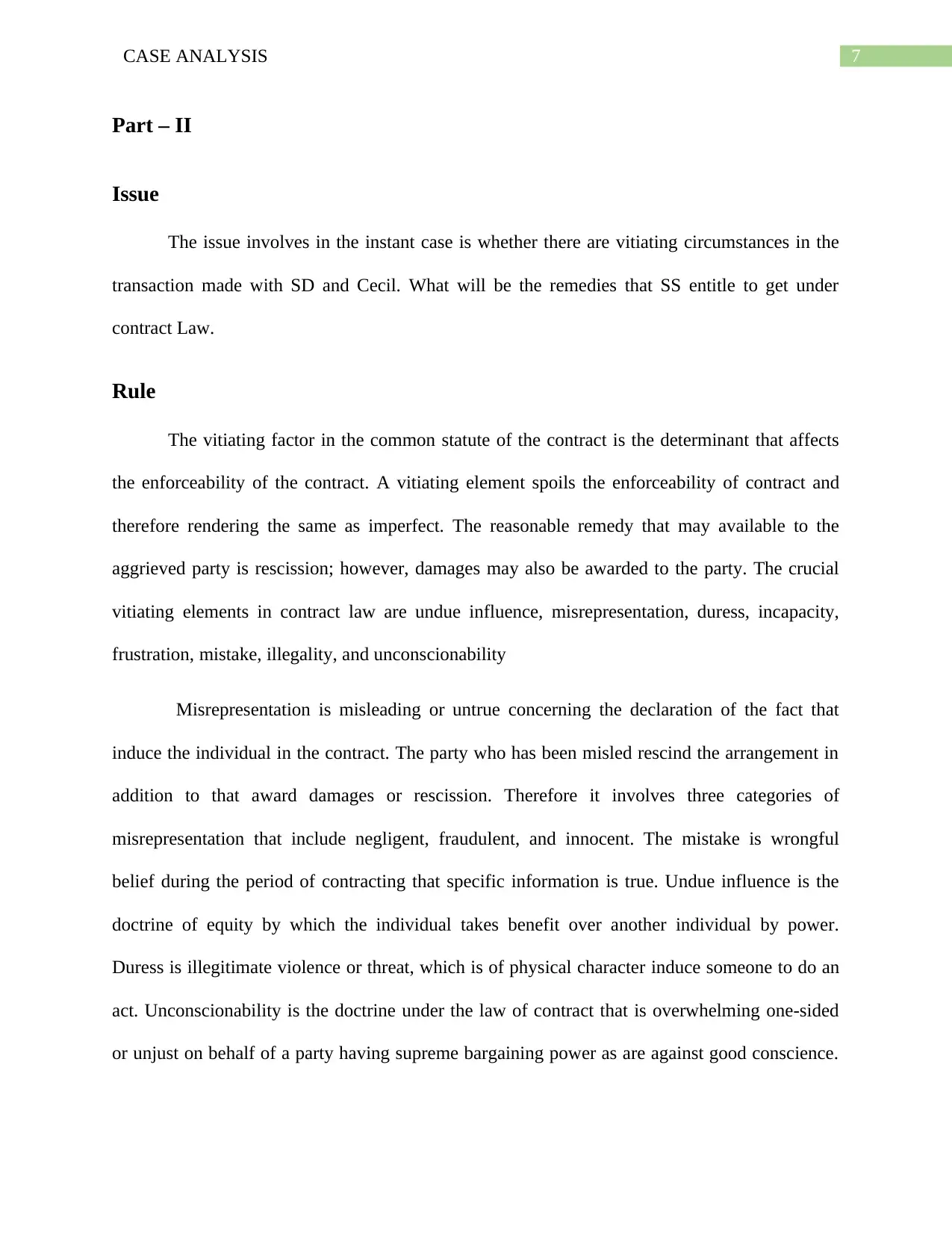
7CASE ANALYSIS
Part – II
Issue
The issue involves in the instant case is whether there are vitiating circumstances in the
transaction made with SD and Cecil. What will be the remedies that SS entitle to get under
contract Law.
Rule
The vitiating factor in the common statute of the contract is the determinant that affects
the enforceability of the contract. A vitiating element spoils the enforceability of contract and
therefore rendering the same as imperfect. The reasonable remedy that may available to the
aggrieved party is rescission; however, damages may also be awarded to the party. The crucial
vitiating elements in contract law are undue influence, misrepresentation, duress, incapacity,
frustration, mistake, illegality, and unconscionability
Misrepresentation is misleading or untrue concerning the declaration of the fact that
induce the individual in the contract. The party who has been misled rescind the arrangement in
addition to that award damages or rescission. Therefore it involves three categories of
misrepresentation that include negligent, fraudulent, and innocent. The mistake is wrongful
belief during the period of contracting that specific information is true. Undue influence is the
doctrine of equity by which the individual takes benefit over another individual by power.
Duress is illegitimate violence or threat, which is of physical character induce someone to do an
act. Unconscionability is the doctrine under the law of contract that is overwhelming one-sided
or unjust on behalf of a party having supreme bargaining power as are against good conscience.
Part – II
Issue
The issue involves in the instant case is whether there are vitiating circumstances in the
transaction made with SD and Cecil. What will be the remedies that SS entitle to get under
contract Law.
Rule
The vitiating factor in the common statute of the contract is the determinant that affects
the enforceability of the contract. A vitiating element spoils the enforceability of contract and
therefore rendering the same as imperfect. The reasonable remedy that may available to the
aggrieved party is rescission; however, damages may also be awarded to the party. The crucial
vitiating elements in contract law are undue influence, misrepresentation, duress, incapacity,
frustration, mistake, illegality, and unconscionability
Misrepresentation is misleading or untrue concerning the declaration of the fact that
induce the individual in the contract. The party who has been misled rescind the arrangement in
addition to that award damages or rescission. Therefore it involves three categories of
misrepresentation that include negligent, fraudulent, and innocent. The mistake is wrongful
belief during the period of contracting that specific information is true. Undue influence is the
doctrine of equity by which the individual takes benefit over another individual by power.
Duress is illegitimate violence or threat, which is of physical character induce someone to do an
act. Unconscionability is the doctrine under the law of contract that is overwhelming one-sided
or unjust on behalf of a party having supreme bargaining power as are against good conscience.
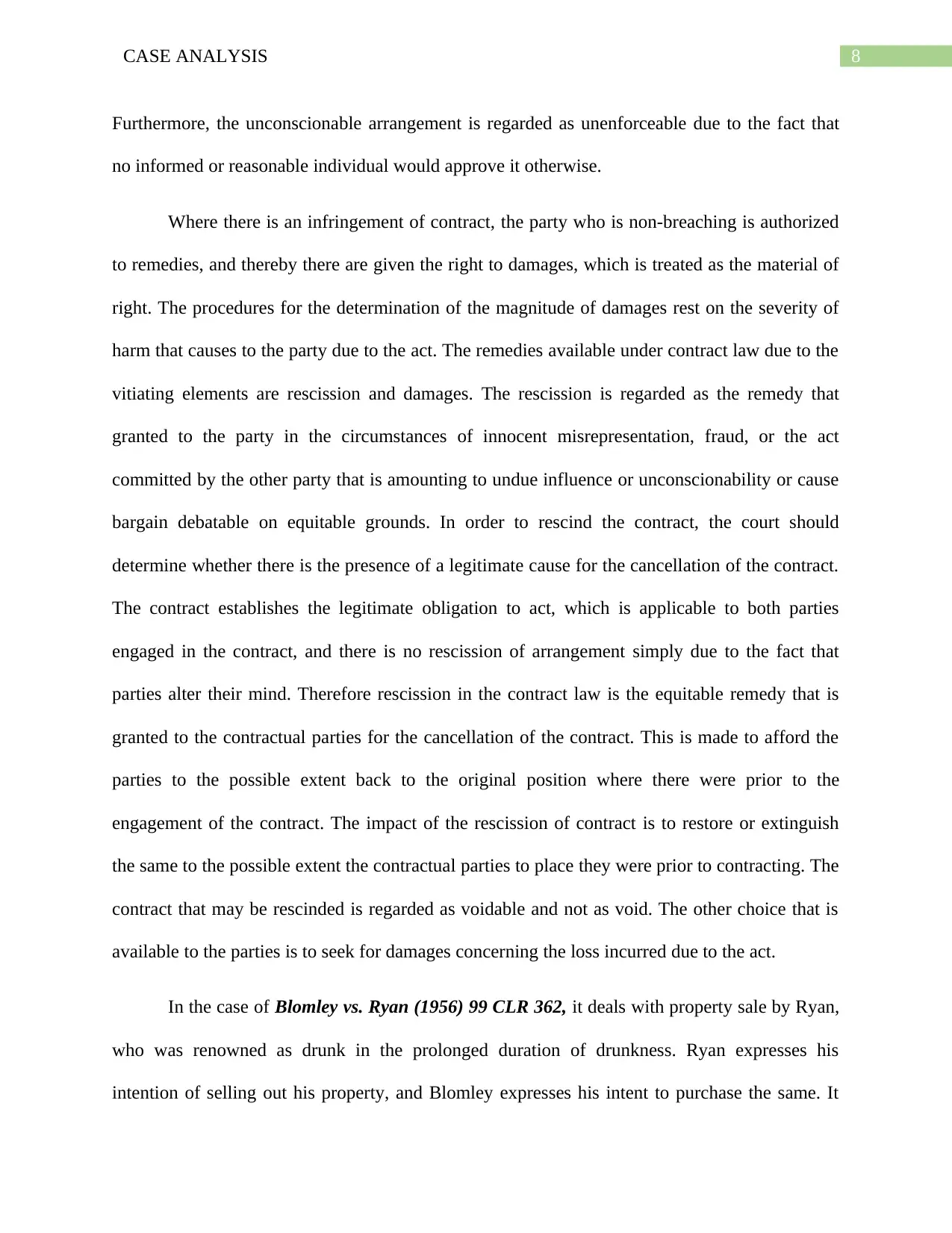
8CASE ANALYSIS
Furthermore, the unconscionable arrangement is regarded as unenforceable due to the fact that
no informed or reasonable individual would approve it otherwise.
Where there is an infringement of contract, the party who is non-breaching is authorized
to remedies, and thereby there are given the right to damages, which is treated as the material of
right. The procedures for the determination of the magnitude of damages rest on the severity of
harm that causes to the party due to the act. The remedies available under contract law due to the
vitiating elements are rescission and damages. The rescission is regarded as the remedy that
granted to the party in the circumstances of innocent misrepresentation, fraud, or the act
committed by the other party that is amounting to undue influence or unconscionability or cause
bargain debatable on equitable grounds. In order to rescind the contract, the court should
determine whether there is the presence of a legitimate cause for the cancellation of the contract.
The contract establishes the legitimate obligation to act, which is applicable to both parties
engaged in the contract, and there is no rescission of arrangement simply due to the fact that
parties alter their mind. Therefore rescission in the contract law is the equitable remedy that is
granted to the contractual parties for the cancellation of the contract. This is made to afford the
parties to the possible extent back to the original position where there were prior to the
engagement of the contract. The impact of the rescission of contract is to restore or extinguish
the same to the possible extent the contractual parties to place they were prior to contracting. The
contract that may be rescinded is regarded as voidable and not as void. The other choice that is
available to the parties is to seek for damages concerning the loss incurred due to the act.
In the case of Blomley vs. Ryan (1956) 99 CLR 362, it deals with property sale by Ryan,
who was renowned as drunk in the prolonged duration of drunkness. Ryan expresses his
intention of selling out his property, and Blomley expresses his intent to purchase the same. It
Furthermore, the unconscionable arrangement is regarded as unenforceable due to the fact that
no informed or reasonable individual would approve it otherwise.
Where there is an infringement of contract, the party who is non-breaching is authorized
to remedies, and thereby there are given the right to damages, which is treated as the material of
right. The procedures for the determination of the magnitude of damages rest on the severity of
harm that causes to the party due to the act. The remedies available under contract law due to the
vitiating elements are rescission and damages. The rescission is regarded as the remedy that
granted to the party in the circumstances of innocent misrepresentation, fraud, or the act
committed by the other party that is amounting to undue influence or unconscionability or cause
bargain debatable on equitable grounds. In order to rescind the contract, the court should
determine whether there is the presence of a legitimate cause for the cancellation of the contract.
The contract establishes the legitimate obligation to act, which is applicable to both parties
engaged in the contract, and there is no rescission of arrangement simply due to the fact that
parties alter their mind. Therefore rescission in the contract law is the equitable remedy that is
granted to the contractual parties for the cancellation of the contract. This is made to afford the
parties to the possible extent back to the original position where there were prior to the
engagement of the contract. The impact of the rescission of contract is to restore or extinguish
the same to the possible extent the contractual parties to place they were prior to contracting. The
contract that may be rescinded is regarded as voidable and not as void. The other choice that is
available to the parties is to seek for damages concerning the loss incurred due to the act.
In the case of Blomley vs. Ryan (1956) 99 CLR 362, it deals with property sale by Ryan,
who was renowned as drunk in the prolonged duration of drunkness. Ryan expresses his
intention of selling out his property, and Blomley expresses his intent to purchase the same. It
⊘ This is a preview!⊘
Do you want full access?
Subscribe today to unlock all pages.

Trusted by 1+ million students worldwide
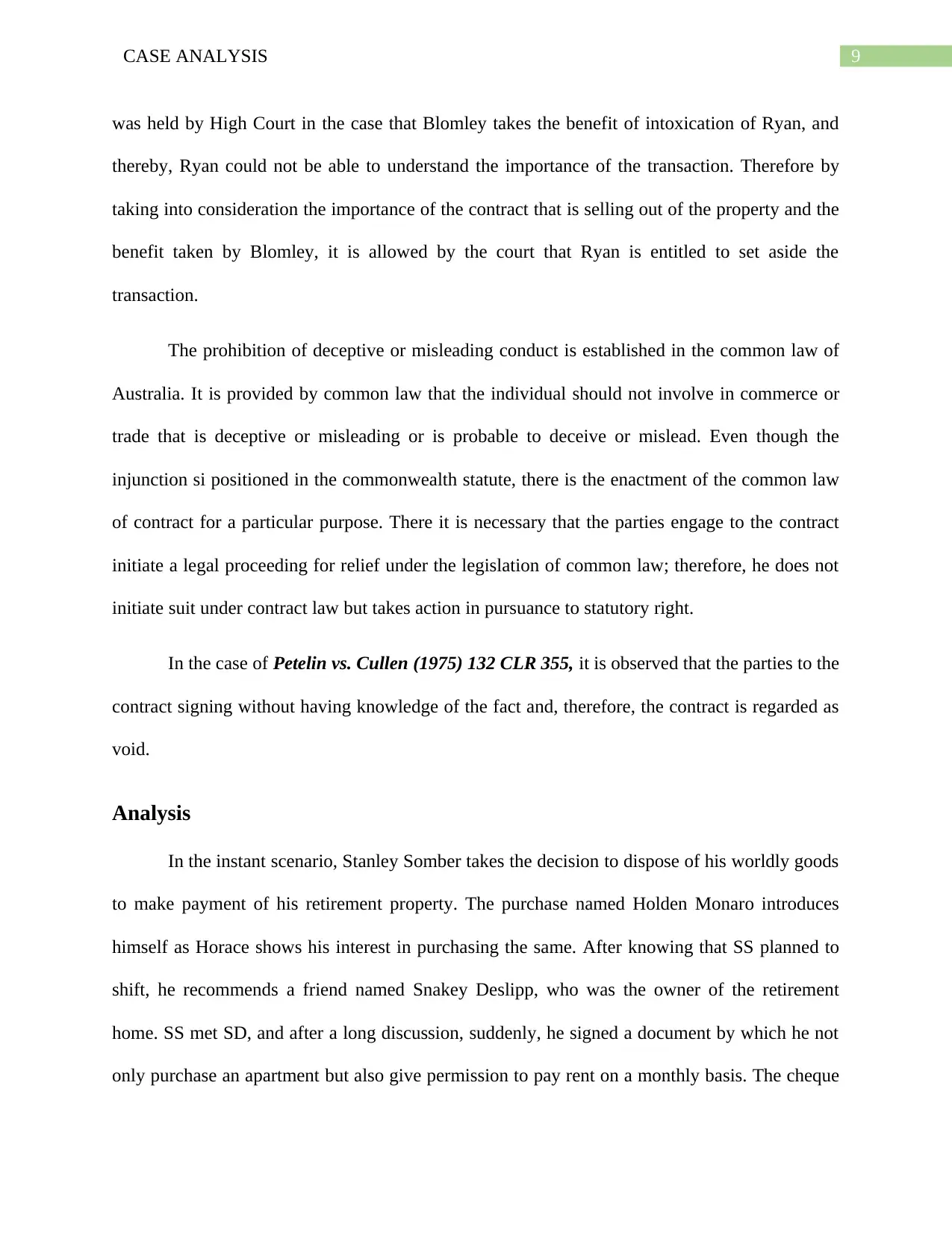
9CASE ANALYSIS
was held by High Court in the case that Blomley takes the benefit of intoxication of Ryan, and
thereby, Ryan could not be able to understand the importance of the transaction. Therefore by
taking into consideration the importance of the contract that is selling out of the property and the
benefit taken by Blomley, it is allowed by the court that Ryan is entitled to set aside the
transaction.
The prohibition of deceptive or misleading conduct is established in the common law of
Australia. It is provided by common law that the individual should not involve in commerce or
trade that is deceptive or misleading or is probable to deceive or mislead. Even though the
injunction si positioned in the commonwealth statute, there is the enactment of the common law
of contract for a particular purpose. There it is necessary that the parties engage to the contract
initiate a legal proceeding for relief under the legislation of common law; therefore, he does not
initiate suit under contract law but takes action in pursuance to statutory right.
In the case of Petelin vs. Cullen (1975) 132 CLR 355, it is observed that the parties to the
contract signing without having knowledge of the fact and, therefore, the contract is regarded as
void.
Analysis
In the instant scenario, Stanley Somber takes the decision to dispose of his worldly goods
to make payment of his retirement property. The purchase named Holden Monaro introduces
himself as Horace shows his interest in purchasing the same. After knowing that SS planned to
shift, he recommends a friend named Snakey Deslipp, who was the owner of the retirement
home. SS met SD, and after a long discussion, suddenly, he signed a document by which he not
only purchase an apartment but also give permission to pay rent on a monthly basis. The cheque
was held by High Court in the case that Blomley takes the benefit of intoxication of Ryan, and
thereby, Ryan could not be able to understand the importance of the transaction. Therefore by
taking into consideration the importance of the contract that is selling out of the property and the
benefit taken by Blomley, it is allowed by the court that Ryan is entitled to set aside the
transaction.
The prohibition of deceptive or misleading conduct is established in the common law of
Australia. It is provided by common law that the individual should not involve in commerce or
trade that is deceptive or misleading or is probable to deceive or mislead. Even though the
injunction si positioned in the commonwealth statute, there is the enactment of the common law
of contract for a particular purpose. There it is necessary that the parties engage to the contract
initiate a legal proceeding for relief under the legislation of common law; therefore, he does not
initiate suit under contract law but takes action in pursuance to statutory right.
In the case of Petelin vs. Cullen (1975) 132 CLR 355, it is observed that the parties to the
contract signing without having knowledge of the fact and, therefore, the contract is regarded as
void.
Analysis
In the instant scenario, Stanley Somber takes the decision to dispose of his worldly goods
to make payment of his retirement property. The purchase named Holden Monaro introduces
himself as Horace shows his interest in purchasing the same. After knowing that SS planned to
shift, he recommends a friend named Snakey Deslipp, who was the owner of the retirement
home. SS met SD, and after a long discussion, suddenly, he signed a document by which he not
only purchase an apartment but also give permission to pay rent on a monthly basis. The cheque
Paraphrase This Document
Need a fresh take? Get an instant paraphrase of this document with our AI Paraphraser
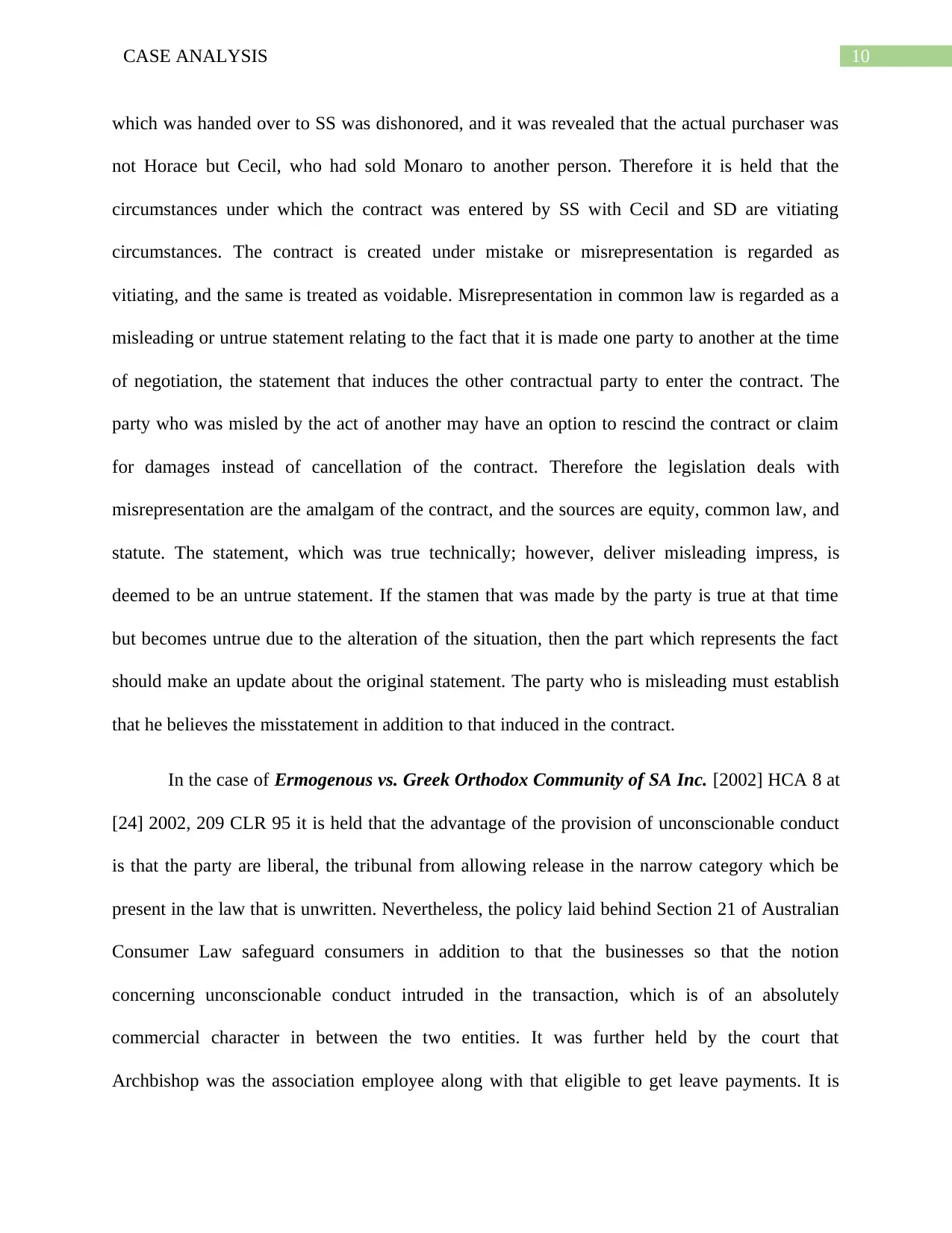
10CASE ANALYSIS
which was handed over to SS was dishonored, and it was revealed that the actual purchaser was
not Horace but Cecil, who had sold Monaro to another person. Therefore it is held that the
circumstances under which the contract was entered by SS with Cecil and SD are vitiating
circumstances. The contract is created under mistake or misrepresentation is regarded as
vitiating, and the same is treated as voidable. Misrepresentation in common law is regarded as a
misleading or untrue statement relating to the fact that it is made one party to another at the time
of negotiation, the statement that induces the other contractual party to enter the contract. The
party who was misled by the act of another may have an option to rescind the contract or claim
for damages instead of cancellation of the contract. Therefore the legislation deals with
misrepresentation are the amalgam of the contract, and the sources are equity, common law, and
statute. The statement, which was true technically; however, deliver misleading impress, is
deemed to be an untrue statement. If the stamen that was made by the party is true at that time
but becomes untrue due to the alteration of the situation, then the part which represents the fact
should make an update about the original statement. The party who is misleading must establish
that he believes the misstatement in addition to that induced in the contract.
In the case of Ermogenous vs. Greek Orthodox Community of SA Inc. [2002] HCA 8 at
[24] 2002, 209 CLR 95 it is held that the advantage of the provision of unconscionable conduct
is that the party are liberal, the tribunal from allowing release in the narrow category which be
present in the law that is unwritten. Nevertheless, the policy laid behind Section 21 of Australian
Consumer Law safeguard consumers in addition to that the businesses so that the notion
concerning unconscionable conduct intruded in the transaction, which is of an absolutely
commercial character in between the two entities. It was further held by the court that
Archbishop was the association employee along with that eligible to get leave payments. It is
which was handed over to SS was dishonored, and it was revealed that the actual purchaser was
not Horace but Cecil, who had sold Monaro to another person. Therefore it is held that the
circumstances under which the contract was entered by SS with Cecil and SD are vitiating
circumstances. The contract is created under mistake or misrepresentation is regarded as
vitiating, and the same is treated as voidable. Misrepresentation in common law is regarded as a
misleading or untrue statement relating to the fact that it is made one party to another at the time
of negotiation, the statement that induces the other contractual party to enter the contract. The
party who was misled by the act of another may have an option to rescind the contract or claim
for damages instead of cancellation of the contract. Therefore the legislation deals with
misrepresentation are the amalgam of the contract, and the sources are equity, common law, and
statute. The statement, which was true technically; however, deliver misleading impress, is
deemed to be an untrue statement. If the stamen that was made by the party is true at that time
but becomes untrue due to the alteration of the situation, then the part which represents the fact
should make an update about the original statement. The party who is misleading must establish
that he believes the misstatement in addition to that induced in the contract.
In the case of Ermogenous vs. Greek Orthodox Community of SA Inc. [2002] HCA 8 at
[24] 2002, 209 CLR 95 it is held that the advantage of the provision of unconscionable conduct
is that the party are liberal, the tribunal from allowing release in the narrow category which be
present in the law that is unwritten. Nevertheless, the policy laid behind Section 21 of Australian
Consumer Law safeguard consumers in addition to that the businesses so that the notion
concerning unconscionable conduct intruded in the transaction, which is of an absolutely
commercial character in between the two entities. It was further held by the court that
Archbishop was the association employee along with that eligible to get leave payments. It is
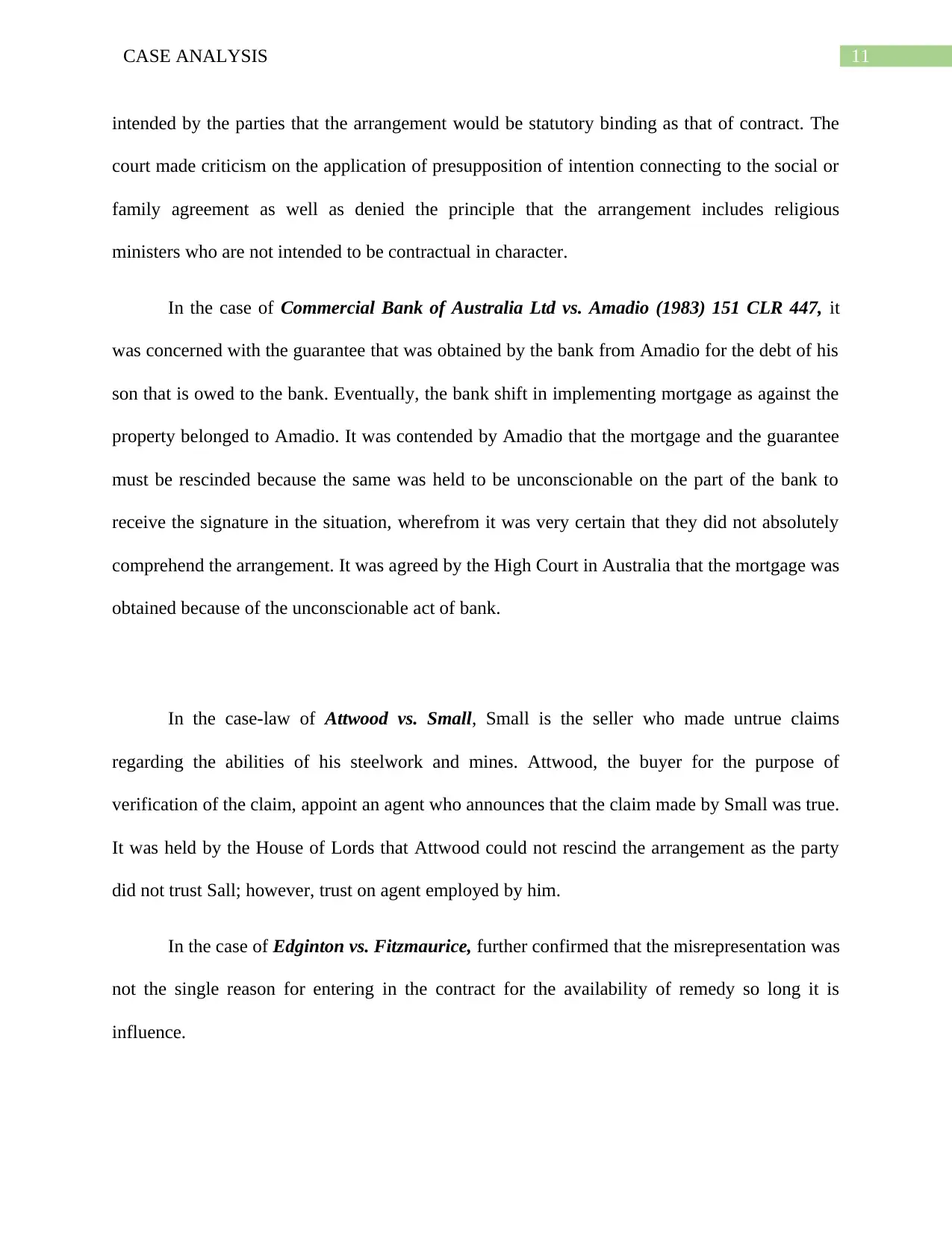
11CASE ANALYSIS
intended by the parties that the arrangement would be statutory binding as that of contract. The
court made criticism on the application of presupposition of intention connecting to the social or
family agreement as well as denied the principle that the arrangement includes religious
ministers who are not intended to be contractual in character.
In the case of Commercial Bank of Australia Ltd vs. Amadio (1983) 151 CLR 447, it
was concerned with the guarantee that was obtained by the bank from Amadio for the debt of his
son that is owed to the bank. Eventually, the bank shift in implementing mortgage as against the
property belonged to Amadio. It was contended by Amadio that the mortgage and the guarantee
must be rescinded because the same was held to be unconscionable on the part of the bank to
receive the signature in the situation, wherefrom it was very certain that they did not absolutely
comprehend the arrangement. It was agreed by the High Court in Australia that the mortgage was
obtained because of the unconscionable act of bank.
In the case-law of Attwood vs. Small, Small is the seller who made untrue claims
regarding the abilities of his steelwork and mines. Attwood, the buyer for the purpose of
verification of the claim, appoint an agent who announces that the claim made by Small was true.
It was held by the House of Lords that Attwood could not rescind the arrangement as the party
did not trust Sall; however, trust on agent employed by him.
In the case of Edginton vs. Fitzmaurice, further confirmed that the misrepresentation was
not the single reason for entering in the contract for the availability of remedy so long it is
influence.
intended by the parties that the arrangement would be statutory binding as that of contract. The
court made criticism on the application of presupposition of intention connecting to the social or
family agreement as well as denied the principle that the arrangement includes religious
ministers who are not intended to be contractual in character.
In the case of Commercial Bank of Australia Ltd vs. Amadio (1983) 151 CLR 447, it
was concerned with the guarantee that was obtained by the bank from Amadio for the debt of his
son that is owed to the bank. Eventually, the bank shift in implementing mortgage as against the
property belonged to Amadio. It was contended by Amadio that the mortgage and the guarantee
must be rescinded because the same was held to be unconscionable on the part of the bank to
receive the signature in the situation, wherefrom it was very certain that they did not absolutely
comprehend the arrangement. It was agreed by the High Court in Australia that the mortgage was
obtained because of the unconscionable act of bank.
In the case-law of Attwood vs. Small, Small is the seller who made untrue claims
regarding the abilities of his steelwork and mines. Attwood, the buyer for the purpose of
verification of the claim, appoint an agent who announces that the claim made by Small was true.
It was held by the House of Lords that Attwood could not rescind the arrangement as the party
did not trust Sall; however, trust on agent employed by him.
In the case of Edginton vs. Fitzmaurice, further confirmed that the misrepresentation was
not the single reason for entering in the contract for the availability of remedy so long it is
influence.
⊘ This is a preview!⊘
Do you want full access?
Subscribe today to unlock all pages.

Trusted by 1+ million students worldwide
1 out of 16
Related Documents
Your All-in-One AI-Powered Toolkit for Academic Success.
+13062052269
info@desklib.com
Available 24*7 on WhatsApp / Email
![[object Object]](/_next/static/media/star-bottom.7253800d.svg)
Unlock your academic potential
Copyright © 2020–2026 A2Z Services. All Rights Reserved. Developed and managed by ZUCOL.





